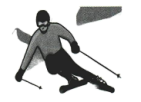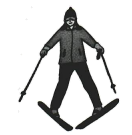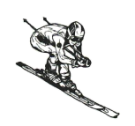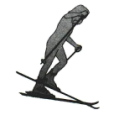1 . Thousands of runners gather for the annual Marathon. The largest holiday race in California
Before long, my
Suddenly, as I make the turn, I am
I slow down and take his lesson. I finish despite the
How many times do we let others
| A.impresses | B.influences | C.attracts | D.directs |
| A.standards | B.abilities | C.grades | D.results |
| A.grin | B.glare | C.stare | D.laugh |
| A.excitement | B.righteousness | C.warmth | D.hotness |
| A.walked | B.missed | C.made | D.disturbed |
| A.competitiveness | B.honour | C.responsibility | D.humour |
| A.friend | B.companion | C.balloon | D.pace |
| A.go | B.run | C.leave | D.come |
| A.worried | B.proud | C.struck | D.satisfied |
| A.glancing | B.gleaming | C.flashing | D.glittering |
| A.adjusted | B.attached | C.turned | D.prayed |
| A.adventure | B.match | C.destination | D.race |
| A.suffering | B.fear | C.pain | D.strength |
| A.define | B.set | C.give | D.claim |
| A.ignoring | B.losing | C.missing | D.forgetting |
2 . During Rick’s birth in 1962, his brain was damaged for lack of oxygen. The doctors told Dick Hoyt that there was no hope of his son being anything more than a “vegetable”. Yet Dick and his wife were determined to raise him at home.
At age 13, Rick told his father he wanted to participate in a five-mile benefit run for the disabled. Dick was not a runner, but he agreed to push Rick through the race course in his wheelchair. That was when a surprising thing happened. During the run, Rick felt as though he wasn’t disabled anymore—he was simply one of the runners. This experience deeply affected Dick, and he committed himself to running an increasing number of events with his son so that Rick could have this feeling as often as possible.
At first, other competitors often treated them as outsiders and even avoided them. But gradually, what began as a way for Rick Hoyt to experience inclusion and equality served its purpose. Running together became a way to send out a message that, as Rick said, everybody should be included in everyday life. The pair’s first Boston Marathon in 1981 finished in the top quarter of the field, and shortly thereafter, attitudes began to change. Many athletes would come up to them before the race to wish them luck.
The 2013 Boston Marathon was the 31st time the Hoyts had run the race, and it was also their last race. Dick has run thousands of miles to be with and support his son. Their athletic pursuits have enriched Rick’s life and had practical benefits for Dick’s life as well: After a heart attack, Dick’s doctor told him he might have died 15 years earlier if he weren’t in such good shape.
1. What inspired Dick to keep running with his son?| A.Rick felt as if he was a healthy person when running. |
| B.Rick could raise money by taking part in running. |
| C.Rick’s wish was to be an excellent runner one day. |
| D.Rick could rebuild his brain by running. |
| A.Everyone is a part of the world. | B.No pain, no gain. |
| C.Where there’s a will there’s a way. | D.Good things come to those who wait. |
| A.Their talent for running. | B.Their purpose of running. |
| C.Their donations to runners. | D.Their achievement in running. |
| A.For 31 years. | B.For 39 years. | C.For 32 years. | D.For 53 years. |
1. What is the woman interested in now?
| A.Running. | B.Jumping. | C.Swimming. |
| A.Amy. | B.Lily. | C.Mike. |
| A.She swims fast. |
| B.She will take part in the long jump. |
| C.She is in the same class with Amy. |
| A.Last week. | B.Last month. | C.Last year. |
4 . Billy Mills was born on the Pine Ridge Indian Reservation for the Oglala Lakota people. His mother died when he was 9 years old. Hurting from the
So Billy started running. He ran his first race
He came out of high school with the fourth-fastest mile in the nation. He went on to the University of Kansas and
At the start of the 10, 000-meter race in that 1964 Tokyo Olympic Games, Billy Mills, an orphaned boy from
In the last 100 meters, an unheard-of Billy Mills
“It was
| A.affair | B.case | C.loss | D.situation |
| A.believing | B.reading | C.noticing | D.writing |
| A.in | B.with | C.for | D.on |
| A.passed out | B.passed away | C.passed off | D.passed up |
| A.independent | B.free | C.bored | D.alone |
| A.until | B.before | C.after | D.when |
| A.studied | B.trained | C.ran | D.performed |
| A.accessible | B.damp | C.advanced | D.unknown |
| A.grew | B.came | C.boiled | D.lined |
| A.professionals | B.judges | C.pedestrians | D.runners |
| A.wandering | B.fighting | C.struggling | D.breathing |
| A.developed | B.circled | C.broke | D.entered |
| A.national | B.history | C.diverse | D.contemporary |
| A.mostly | B.nearly | C.simply | D.only |
| A.create | B.fix | C.freeze | D.hide |
5 . My Favourite Sport
Skiing is my favourite sport, even though I have only skied for four days in my whole life. Last year, my father promised to take me on a holiday if I did well in my final exams. When I got straight A’s, Dad said, “How about a weekend at the Botanical Gardens?” However, my mum said, “No, you promised a special holiday. I think you ought to keep your word.” And, despite the expense, he did.
My dream was to see some real snow, so in the Christmas vacation we flew to Seoul, South Korea, and then took a shuttle bus which runs back and forth between Seoul and Muju Resort. As the bus climbed through the mountains, we saw the snow on the trees. I was raring to get out of the bus. No one in my family had ever touched snow before, so soon after the arrival, we were all like little children — we picked snow up, made snowballs, and threw them at each other!
Then we checked in at the hotel. Our room overlooked one of the ski slopes. The slope was floodlit, so we watched people skiing until 10 p. m. We could not wait to try it ourselves.
The next day we had our first skiing lesson. We rented our ski suits, boots and skis, and went outside onto the snow. Wearing skis for the first time makes you feel very strange. Suddenly you find you cannot even walk.
Our instructor took us onto a gentle slope, and showed us some basic skills. In order to go up a hill, you have to stand sideways, and go up step by step. You must point the tips of your skis together so that you can stop. However, the tips must not cross, or you will fall. You should not ski alone in case you fall and get injured. To be honest, that first lesson was not a great success, and I kept on falling down!
However, the next day I definitely improved. I only fell over a few times, and I managed to do a few longer runs. I felt pleased with myself, and the instructor congratulated me, so I felt great. Although it was very cold, I spent most of that holiday skiing. It was the most wonderful time of my life.
Nevertheless, it was all over too soon. Now I have decided to work part-time this summer after the College Entrance Examination, so I can earn enough money for another super skiing holiday.
1. The author was able to enjoy his skiing holiday mainly due to ________.| A.his mother’s promise | B.his poor skiing skills |
| C.his good marks | D.his dream of seeing snow |
| A.dying | B.afraid | C.gutted | D.determined |
A. | B. | C. | D. |
| A.The author is now a student in the graduating class. |
| B.The author wants to work as a ski instructor in the future. |
| C.The hotel the author lived in was well-lit, overlooking the ski slope. |
| D.The author spent all his days skiing during the holiday. |
6 . The days when art was an Olympic sport
Did you know that creating works of art used to be an Olympic competition?
The idea to include art in the Olympics came from Baron Pierre de Coubertin, who was the founder of the International Olympic Committee, which created the modern Olympics. Coubertin believed that the arts and sports were linked and was impressed by anyone who had a firm command of both a sport and an artistic discipline.
Why aren’t the arts included in the Olympics today?
For starters, only amateurs were allowed to compete in the arts part of the Olympics.
Secondly, works of art created had to have sports as the subject matter.
Finally, one of the biggest reasons was that the arts are subjective. Sports can be judged by time and distance, making it easy to determine who is the winner.
| A.What is a discipline in the Olympic Games? |
| B.Why was art made an Olympic discipline? |
| C.On the other hand, the arts are not quite so easy to judge. |
| D.This rule made the objects produced seem really boring. |
| E.It means that many famous artists were banned from participating. |
| F.However, the arts part of the Olympics Games was soon abandoned. |
| G.For 36 years, from 1912 to 1948, artists participated in the Olympic Games. |
7 . It’s fight night in a Berlin club. The lights go down, the stage door opens and out walks a salesman from San Francisco. David “\Double D\” Depto has travelled 8, 000 kilometres in search of glory. As he first walks, then jogs, towards the boxing ring, this muscular, bare-chested American looks cool and confident. But so does his opponent. Waiting for him in the blue corner is Frank Stoldt, a tall, strong German policeman, who calls himself “\Anti-Terror Frank\”. For obvious reasons, the crowd is on his side.
The bell rings. Round one! The fighters come out. But then, something rather strange happens. The two players sit down at a table which has a chessboard on it and start playing chess — in the middle of the boxing ring.
“Why?” you may ask yourself. Well, this is chessboxing, and tonight is the final of the first Chessboxing World Championship.
The rules of a chessboxing match are simple. There is one round of chess and then one round of boxing. Punching power alternates with brainpower. All in all, you have 11 rounds in which to either checkmate your opponent or knock him out.
Two sports in one means double the pain and double the pressure. Before this big fight, Frank spent hours doing exercises that prepared his mind as well as his muscles. Winners in chessboxing are people whose mental strength equals their physical strength.
But why do it in the first place? Why put yourself through this physical and mental torture? For David Depto, it’s all about proving that you can be a boxer and still have a brain. The sport has taken off in Germany, where they are preparing the next generation of chessboxing champions. It’s even being taught in a Berlin school.
Back in the ring, it is round seven and the players are locked in battle around the chessboard, sweat pouring from their foreheads. Suddenly, Frank Stoldt sees an opening and moves in to finish the match. Queen to G7...checkmate!
The referee stops the match, the crowd erupts — the local hero has won and is given the world title belt, which proves that, when it comes to mixing brains and muscle, Germany really is the Grand Master.
1. What’s the way in which a match can finish?| A.Either checkmate the opponent or knock him out. |
| B.One of the players gives up or is sent to hospital. |
| C.The referee counts down from eight to zero in the round of chess. |
| D.One of the players finds the opening into the court which is locked. |
| A.Compared with boxing, it means half danger and half stress. |
| B.It requires more mental strength than physical strength. |
| C.The sport is popular in Germany, where it is a school subject. |
| D.The players play chess in the middle of the boxing ring. |
| A.leaves the stadium | B.bursts into cheers |
| C.interrupts the ceremony | D.fights with the opposing fans |
8 . When watching sports events, we often notice athletes with their earphones on while preparing in the locker room or entering the stadium. They keep their eyes shut, and gently nod along the beats. It seems as if the music is empowering them and toughening them up for the competition. But is there any science behind such practice?
According to a recent research, it turns out there is. Music actually does make us feel powerful, but not all songs have the same effect. The research was led by Dennis Hsu of the Kellogg School of Management at Northwestern University in the US. His team had people listen to 31 songs of different types. The listeners felt powerful after listening to some songs, such as Queen’s We Will Rock You and 2 Unlimited’s Get Ready for This. Researchers also found that high-power music made people want to take control in social events and come first in competition. As for the reason for music’s magical power, Hsu’s team came up with one possible explanation: When people hear music that expresses a sense of power, they mimic these feelings in their mind.
So, when choosing music, we need to look at the type of music. In previous research by the Music in Exercise and Sport Group at Brunel University in London, they found that pop was perfect for slower, more repetitive-type tasks. Dance music was found to be best suited to strength and weight training because it’s “fast and rhythmical”. During high-intensity workouts, though, you’d better not listen to rock. Its different changes in tempo can affect your rhythm.
1. Why athletes were mentioned in the first paragraph?| A.To list things athletes have in common with other people. |
| B.To describe athletes’ common habits before sports games. |
| C.To get readers to wonder whether music matters in sports. |
| D.To explain why athletes like listening to music before games. |
| A.Listening to music can always boost the athlete’s performance. |
| B.People listening to powerful music are likely to produce similar feelings. |
| C.The result of a game is mainly affected by the physical condition of the players. |
| D.Most athletes don’t know the effects of high-power music on their performance. |
| A.Pop music. | B.Dance music. | C.Rock. | D.Blues. |
| A.With comparisons. | B.Through examples. |
| C.By giving general rules. | D.Through listing figures. |
1. 报名时间及方式;
2. 需要提供的信息;
3. 费用及其他。
注意:1. 词数100左右;
2. 可以适当增加细节,以使行文连贯。
_______________________________________________________________________________________________________________________________________________________________________________________________________________________________________________________________________________________________________________________________________________________________________________________________________________________________________________________________________
Diet and exercise are two of the most important parts of leading a healthy life. There is
Walking can help you achieve your healthy living
Another benefit of eating right and exercising is that it can lead to a positive outlook in life. Practicing these good habits can make you feel and look better. Your clothes will fit a bit better,and you will sleep better,



